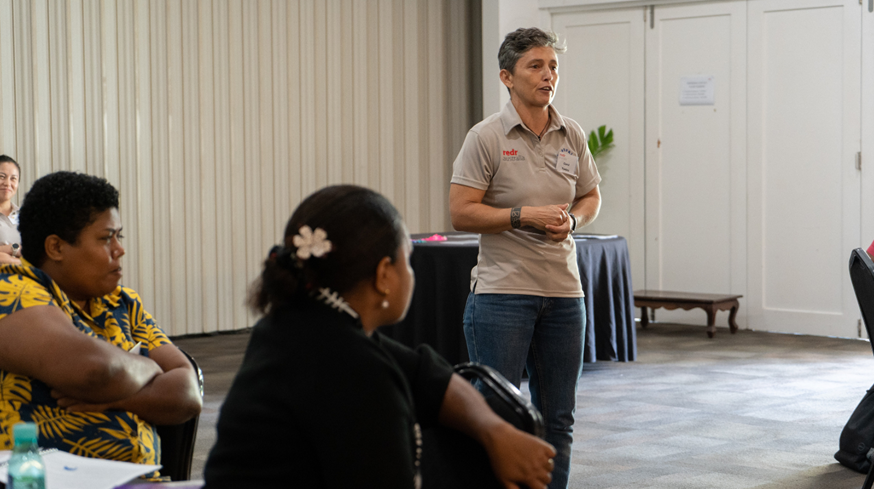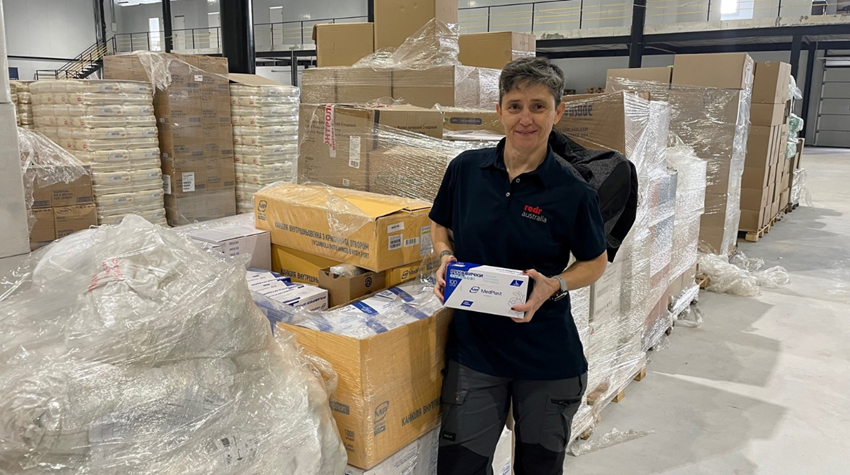Growing up in a war zone, Carol understands what it means to have your community uprooted. However today, as a RedR Australia roster member and associate trainer, she’s finding rich meaning in providing dignity and safety for others facing conflict.
Recently deployed by RedR Australia to Ukraine with global non-profit organisation FHI 360, Carol was faced with the realities of war once more. She explains how, on the 13-hour train ride to Dnipro, the meaning of war became clear.
“On the train ride, I saw other trains going past carrying tanks and army trucks. And when we stopped at the station, I’d see soldiers getting on the train and families—wives and kids—saying goodbye,” said Carol.
“That’s when it really hits you.”
Providing support to displaced people
With programs in more than 60 countries around the world, FHI 360 is dedicated to improving lives in lasting ways.
Being a logistics coordinator for FHI 360 in Ukraine, Carol’s work was focused on supporting the health and protection of communities affected by the current war. Hosting ten roaming medical units in previously occupied areas where they are needed, FHI 360 requires dedicated logistical support to ensure communities can access assistance as soon as possible.
“Each unit consists of a doctor, a nurse, social worker and a psychologist,” explained Carol. “They’ve also rehabilitated damaged clinics. They’ve provided generators—because this all happened during winter—so they’re able to keep those clinics up and running, and warm. And in each mobile unit and clinic, they placed a psychologist.”
Carol’s role was to ensure that the mobile units and clinics have the supplies they need. Much of her work involved reviewing the current processing and looking at more effective and efficient ways to procure the required items and get them to the multiple storage locations, and then distribute them to the mobile teams.
Carol also helped to lease new storerooms in some of the locations with acute needs to ensure medications were easier and quicker to access and replenish.
“At the end of the day, our clinic staff are a lot happier once they've got stock and it's organised. Then it's easier to distribute. It’s positive—we are making real progress,” said Carol.
After completing a 10-week deployment earlier this year, FHI 360 recently asked Carol to return to Dnipro to undertake a second 8-week deployment to assist with the close out of the USAID/BHA grant and ensure that all procedures related to the procurement were audited.
A witness to courage and resilience
In communities in Ukraine, many elderly people need significant support.
“The clinics mostly work with elderly people, who do not have the capacity to get up and move out of these areas. Some of them don't have any family to go to, or they just don't want to leave their home,” said Carol.
“When areas have been quite heavily hit, many elderly people have struggled with the traumatic effects. So FHI 360 provides a lot of psychosocial support for the elderly,” explained Carol. “Our focus is on immediate support with dignity kits, primary health care and psychological support.”
Working alongside many internally displaced people during her deployment, Carol was moved by their resilience and courage.
“Many staff working for FHI 360 in Ukraine are internally displaced people. They've gone through trauma, they've had to evacuate; they've lost everything and had to start fresh. I take my hat off to the Ukrainians. They still come in every day with a smile on their face.”
Working together with and for Ukrainians, Carol was inspired by the power of communities supporting each other.
“Actually seeing the health supplies being loaded on a truck and heading to the displaced people where it’s needed...it makes all those staff feel like they're contributing to their own communities. It just makes it all worth it. It doesn't matter what spoke you are in the wheel that's working in the office, together we’re all getting support to the community. It's just so inspiring.”
 Across Australia, the Pacific and Asia, Carol has also shared her expertise with hundreds of aspiring humanitarians as a trainer for RedR Australia’s courses.
Across Australia, the Pacific and Asia, Carol has also shared her expertise with hundreds of aspiring humanitarians as a trainer for RedR Australia’s courses.
I grew up in a war myself
Prior to this deployment, Carol spent nearly two decades clearing mines for communities around the world. For her, it’s very meaningful to see people return home.
“I’m helping people get back their dignity,” said Carol. “Seeing people being able to return once land mines have been cleared from the village—seeing them go home, creating community again, starting to plant, set up football games.”
“I know what it's like to be displaced. I'm Zimbabwean and I had to leave Zimbabwe. I have no home there. I have no family there. And I grew up in a war myself.”
So, for Carol, working with Ukrainian communities is deeply meaningful.
“I understand what it's like to belong somewhere and want to be part of a community. It doesn't matter if you're sitting behind the desk in an office, you're still part of the solution to allow people to return home or to have some form of protection, safety and dignity, and feel like they belong.”
“Seeing that is the reward.”
Learn more about RedR Australia’s work in crises around the world.


